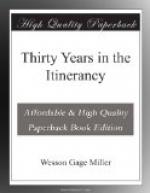One of the champions had been a surgeon in his time, and had cut human flesh with becoming recklessness, but now he, as well as the entire Committee, struck a new experience. To strike Missions off the list, and cut down the appropriations to others, is comparatively an easy task in the quiet and secluded confines of a committee room, but to do either in the presence of the very men who expected to occupy those fields the coming year, and who knew the poverty of the people, was quite another thing. The flood-gates of speech-making had been opened by the Committee, and it was now impossible to close them. The balance of the afternoon was given to stormy debate, and into what disorder the meeting might have drifted, if the coming evening had not made its appearance, it is impossible to conjecture.
The next day the Committee took another new departure, and invited the Presiding Elders, who had studied these matters and looked the ground carefully over for a whole year, before them. The Committee were now able to complete their labors and make such a report as had usually been presented to the Conference. But the Conference became fully satisfied that this experiment needed no duplicate, and, for years after, the mention of the “Committee of the Whole on Missions,” did not fail to excite mirth.
Early in the session, the election of delegates to the General Conference occurred. As I was too young to be thought of in that connection, I was permitted to sit quietly and take notes. The only issue of any great importance in the election was the slavery question. And as this institution had already been put in issue in the general elections of the country, it could not well be left out on this occasion. So it was made the chief subject of discussion. To be a thorough-going anti-slavery man was the stubborn test of qualifications for a delegate. And that there might be no mistake on this point, it was deemed advisable to have an able committee present to the body as a platform a report that should make the absolute prohibition of slavery its chief plank. But before I make further reference to the report it will not be amiss to refer briefly to the subject of slavery in its relations to the Church.
At the organization of the Church in this country, and for years thereafter, the testimony she gave against American Slavery was distinct and unequivocal. Both the Ministers and people were agreed that the Institution was, as Mr. Wesley was pleased to call it, “The sum of all villanies.” Agreeing in this, they further believed that, as a relic of barbarism, it would soon pass away. Under this conviction they hardly deemed it necessary to enter up any very stringent enactments against it, save that it might be well as a temporary arrangement to provide that there should be no traffic in slaves. Under such a regulation matters passed on for a term of years. But in due time it was found that the tendency of events was not altogether satisfactory.




